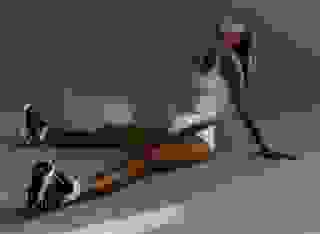- Gay Male
- Legal Self-Realization
Note: You can change font size, font face, and turn on dark mode by clicking the "A" icon tab in the Story Info Box.
You can temporarily switch back to a Classic Literotica® experience during our ongoing public Beta testing. Please consider leaving feedback on issues you experience or suggest improvements.
Click hereSteven was the youngest judge ever appointed to the Circuit Court. The job would involve travel to the five outlying counties in the circuit, and that meant he would be away from his beloved Marina for two weeks out of each month. Not optimal for their marriage, but the Circuit Court appointment was only for three years and if all went well he would then almost certainly be promoted to the Main Court bench.
* *
Steven sighed as he put down the prosecution's brief. Were they serious? The brief included the infamous "Special Restrictions Form," which could temporarily suspend a prisoner's constitutional rights.
Already legal challenges to the Form were starting, and Steven was glad that this test case had been assigned to him--involving shocking events that had allegedly transpired at one of the outlying counties in his Circuit.
The prosecutor argued that the recently legislated Special Restrictions Forms were a mockery of justice. She argued it was unbelievable that in modern civilized society a prison Warden could use a one-page Form to strip a man of all his rights. It was a clear abuse of power--including sexual abuses of power, as in the multiple allegations summarized in her prosecutor's brief.
Personally, Steven agreed with her. But his legal training had taught him not to use his subjective reactions in reaching his decisions. The law had its own logic.
The prosecution's list of witnesses, Steven noticed, contained the name of another judge, Robert "Bobby" Fields, currently on an unexplained leave of absence. Until Steven's appointment, Bobby Fields had been the youngest judge in the state. In light of some of the strange rumors about Bobby's private life swirling through legal circles, however, Steven wondered if Bobby shouldn't be testifying for the defense instead.
The air in Steven's chambers seemed warmer than usual, and he rose from his chair thinking to open a window before remembering that they had all been sealed when the building's new heating and cooling system had been installed. He didn't like it, as not being having access to fresh air whenever he wanted made him feel, paradoxically, a bit like a prisoner rather than a judge.
He returned to his desk.
* *
Steven frowned as he turned to the defendant's documents. On top was a list of "hired-gun" expert witnesses, headed by the infamous Dr. Brantley. In Steven's opinion, Brantley was a suspect human being. Yes, he was a highly qualified psychiatrist--but one who seemed always to find justifications for the darker things human beings did to each other. The mere sight of his name seemed to bring an alien smell to the air to Steven's judicial chambers.
The defense attorney's brief referred to Brantley's latest scholarly article--"Incarceration Power-Submission Therapy as Exemplified in the Person of 'the Warden,'" by B.H. Brantley, M.D., Ph.D., published in The Journal of Psychiatric Jurisprudence, cited as directly on point. He scrolled the text down his computer screen and read the first highlighted passage:
"It is inaccurate and simplistic to dismiss 'the Warden' as the stereotypical, corrupt law officer. We would better view him as a sort of therapist who uses the penal system to provide therapy for men whom he judges would benefit from it."
Steven took a deep breath and moved on to the next highlighted portion:
"It has been our observation that many of today's urban, professional men have devoted too much time to artificial careers. Such careers have diminished their capacity to engage in traditional masculine work--with their hands, outdoors, and using their physical bodies.
"Modern artificial man has also come to rely upon fancy food and drink, rather than healthy basics"--Steven glanced at the iced mocha latté on his desk-- "and to enjoy wearing unnecessary fashion."
That hardly seems fair, Steven thought. Good clothes were necessary in the legal profession. Especially now that he was a judge, his spending the extra few thousand dollars for new suits, one for each day of the week, was entirely justified. It lent dignity to his person and his higher position.
"Such a man has become almost feminized," Dr. Brantley's report continued, "in coming to value accessories and even scents and hair products."
Well, Steven granted, his fingers unconsciously touching the smooth silk of his tie, I didn't start liking that fancy hair conditioner until Marina gave me some for my birthday last year.
"Overall," the report summarized, "many men have become less than fully developed. They have neglected to create a well-rounded life-style or to develop their fully masculine potential."
Ha. Who has time for all of that? His daily hour of workout at the gym was about all his schedule allowed. Still, the comment stung Steven's pride. Was something perhaps lacking in his life?
"At the same time they are aware that other men have not been so self-restrained and have realized their full male potential."
Steven wondered who these fully male men were supposed to be. He knew plenty of masculine men in the legal profession and in the city more generally.
And what of Brantley himself--wasn't he just another nerd intellectual with a string of fancy degrees? Then Steven remembered that Brantley was ex-military, having served overseas, and that he'd put himself through medical school while working nights for the Sheriff's department in one of the nearby counties.
Another highlighted passage:
"For the less-fully developed males, however, the self-recognition of the gap between the two types of men typically operates at the subconscious level. Deep down, they often harbor an almost pathological need to submit to some ruthless authority, to undergo experiences that are totally beyond their control. Paradoxically, it is for them a liberating experience, as they are forced to break through their limitations."
Steven felt a bead of sweat materialize suddenly on his back. He shifted in his chair and felt it trickle down his spine.
"Such men may seem--to the untrained eye--to be happy in their careers and their marriages. They have the conventional satisfactions of good pay, a nice home, social standing, and erotic pleasures with their wives.
"And yet they feel, in the right circumstances, powerful urges that threaten to overtake their minds and bodies. Particularly when they are (a) outside the reach of conventional civilization and (b) in the presence of fully male men."
Steven granted that there was an internal logic to Brantley's line of argument. But surely that could only apply to a tiny percentage of men. And certainly not to normal men such as himself. His eyes scanned to the next highlighted portion:
"Part of the Warden's training is to develop a knack for spotting such men when they first arrive at his prison. Initially, of course, all new arrivals are required to strip down and submit to a cleansing shower. The lesson proper then begins with a subsequent nude search (including a cavity search). The new arrival's reaction to his nudity and the cavity search are carefully monitored."
Steven squirmed in his chair.
"If the new arrival's reaction is hostile, then it can be ended in perfunctory fashion. If, however, his reaction indicates a receptiveness, then the search can be extended. Often the Warden can introduce a teasing atmosphere into the proceedings, with words and gestures underscoring the therapeutic power dynamic between the males involved."
Steven read those words again: "teasing"... "receptive" ... "power."
"Psychologically," Brantley's report continued, "this dynamic between the two kinds of men enables a determination of the proper 'therapeutic' placement of the new arrival. As one warden has observed based on his professional experience, 'The harder the cock, the more effective the lesson.' Crude words, but their very crudeness underscores the blunt methods necessary for proper therapy in such cases."
Steven's chamber seemed to be getting unusually warm, and his suit began feeling constricting and clinging to his skin. Was the air-conditioning again not working properly?
"Initially, the Warden will merely tease his charge at length and give him ample opportunity to resist. He will introduce mild instructions--and mild penalties if they are not followed immediately. The prisoner's reaction to the penalties will also be monitored.
Then followed a short list of possible penalties.
"But, if the Warden determines to his satisfaction that a man really does need to submit, then he obliges him. He will carry on, ratcheting up the intrusions and penalties for the subject male, through intermediary stages, until he ends by assigning him to a special section at the county prison farm."
The defense's attorney then stopped quoting Dr. Brantley and reached his own conclusion:
"Such is the rationale for the Special Restrictions Form, which allows this final stage to be accomplished most efficiently, as it eliminates the need for further slow, expensive, and often doubtful judicial process..."
* *
Steven's reading was interrupted by a knock on his door. He shook himself. "Come." The door opened slightly, and his bailiff peered round the edge.
"Pardon, Your Honor, but I thought I ought to warn you that the A-C in your courtroom is out again. It's about 85° in there now, but Maintenance say they won't be able to get to it until next week... at least. And there's no other room available."
Damn! "Okay, Dave. Thanks for the heads-up. At least the room won't be packed with spectators. See you in a few minutes."
The bailiff left, and Judge Steven Hill rose from his desk, heaving a "Why me?" sigh. He stared at himself in the tall mirror with the lacquered hardwood frame. For a moment he admired his appearance--the line of his suit and the perfectly complementary silk tie. He'd just had a haircut yesterday, and it looked great.
Then he blushed slightly, realizing that he shouldn't be vain. Instead of focusing on physical attractiveness his mind should be thinking about the day's weighty legal matters.
He remembered the bailiff's warning about the heat and sighed again. How would he survive the many hours ahead in a hot courtroom? Why hadn't I at least chosen a summer-weight suit today? He'd have to dress down.
He took off the crisp grey worsted suit... set aside the cufflinks that were a present from his wife... and removed his starched white 100%-cotton shirt. He was now reduced to his socks, shoes, wristwatch, and silk underwear. Fortunately, he'd worn briefs instead of boxers. They were cooler, at least.
He donned his black robe. Posing again in front of the mirror, he satisfied himself that he looked suitably judicial: his robe covered everything between his neck and his feet, and those were covered by his custom-made leather shoes. No one need know he was mostly undressed underneath.
A cynical thought occurred to him that he might even be a metaphor for the whole legal system--outwardly seeming to be proper... but something very different under the surface.
He glanced at his wristwatch, picked up the stack of files, and swept out of his chambers.
* *
"All rise! This court is now in session, the Honorable Judge Steven Hill presiding," the bailiff announced.
Steven took his seat on the bench. "Be seated."
He looked with mild distaste at the contending attorneys: that ambitious Julia Smith whose feminism had some good points, Steven believed, but seemed to be driven by some sort of strong anti-male animus. Any case involving powerful men seemed to bring out an under-current of hostility in her.
The defense attorney was not well known to Steven. Anderson Garrison III was partner in a law firm he'd been groomed to take over from his father. He seemed only to take exclusive cases for a select clientele. How the defendant Warden warranted being on that select list Steven did not know.
The Warden had been charged with allowing a variety of offenses to take place in the prison he oversaw. Most of them involving sexual abuses and humiliations. Of course there were always rumors about what went on in the county prisons. Yet the Warden's prison had featured more frequently in the rumor mill and, finally, explicit charges had been filed.
Judge Steven would be deciding whether the allegations were true and, if so, whether the Special Restrictions Form legislation authorized them, making the Warden and his staff immune from prosecution.
* *
The hearing proceeded slowly. The witnesses for the prosecution seemed to be a lackluster group, especially given the explosiveness of the charges. They mostly spoke in monotone when asked to give evidence about what the Warden and his team had allegedly done.
Judge Steven noted that the prosecution's parade of complainants were all quite similar: 25 to 45 years old, educated, already successful in their careers--doctors, a TV personality, businessmen, two socialites who ran a non-profit, lawyers, civil servants, and even one academic.
It was surprising how many such individuals had been convicted, all of them of quite minor offenses. Steven also noticed that all had been sentenced to very short amounts of prison time. Why hadn't they been given fines instead?
Also interestingly, Steven noted, they all seemed to be above-average in attractiveness. Some were quietly resentful, but most were curiously subdued.
Prosecuting attorney Julia Smith was obviously frustrated at how little information the male witnesses were providing. Clearly, she had expected that they would willingly recount what had happened to them while in the Warden's care.
Even Judge Bobby seemed hesitant on the witness stand, almost sheepish, in describing his alleged experience. Prosecutor Smith seemed especially upset with him. She asked him leading questions in explicit language, reading a list of demeaning and obscene actions that she clearly expected him to confirm had happened.
But Bobby's responses were low-key and downplaying. Steven had never known Bobby to tell even a white lie, so his hedging and avoidance was suspicious. Did they have some sort of hold over him?
There was one exceptional witness, though, who seemed more impassioned and perhaps braver than the rest. He was a sophisticated younger career man who recounted a horror story on the witness stand, claiming that in the one short week he had been incarcerated he'd been subject to numerous degrading strip searches and forced to service five men sexually, two of them at a party outside the prison. He had been blindfolded, he said, and did not know the party's location.
This witness's detailed telling caused Steven to declare an early lunch. He especially needed to wipe himself down with a cooling towel and to change his wet underwear.
* *
When the court resumed after lunch, cross-examination of the witnesses began. Defense attorney Garrison had little trouble in establishing that the claims of "humiliation" and "whipping" of "innocent victims" could just as easily be seen as "embarrassment" and "spanking" of "men in need of an attitude adjustment." They were, after all, guilty and had been convicted and sentenced to prison.
The constant recital and arguments about what allegedly had happened to these men was affecting Steven. The words were not just abstract but seemed to be causing vivid images to persist in his mind.
He took another quick recess in the afternoon, as he was sweating under his robes. It wasn't just the un-air-conditioned courtroom. It seemed like inside his body had become a slow-burning furnace. The parade of claims of humiliations and unusual sexual activities was affecting him strangely.
Yet in Steven's private judgment, the prosecution's case was weak.
She had been able to prove only that the Warden had made the prisoners work in the fields and pick up trash beside the country roads. There was no compelling evidence that the men were made to work in the nude.
Nor had the prosecution proved that some of the men had been put to work in a strip club owned by a friend of the Warden.
Nor that they had been taken to special parties at a remote luxury ranch or to a corporate retreat at an unknown location and made to service the men there.
Nor that the Sheriff of the county in which the Warden's prison was located had provided security services for the outings.
Nor had it actually proved that the Warden was a believer in Dr. Brantley's theories or that he had consulted Dr. Bartley himself.
Aside from the testimony of Judge Bobby and the one impassioned witness, the prosecution's case was surprisingly lacking.
Late in the afternoon, Steven told the court that the defense would get its turn the following day. Attorney Garrison promised to be quick, so Steven instructed both attorneys to be prepared for closing arguments in the afternoon.
* *
The defense opened its case by calling the noted (or notorious) Dr. Brantley, whose scholarly testimony about male power dynamics left the prosecution apparently bewildered. Attorney Smith tried, but she had no coherent counter-argument that submission-to-power therapy was not useful to some men in such circumstances.
Defense attorney Garrison then entered a copy of the Special Restrictions Form, reminding everyone that the legislature had authorized its use. Additionally, he provided a copy of the Form that each complainant-witness had signed after entering the Warden's prison.
That seemed especially important.
Steven reviewed each form, noting all of them showed the prisoner-subject's name, mug shot, fingerprints, charge and specifications, sentence (usually no more than 30 days), along with signatures of the judge and the Warden.
The most telling feature, though, was that each form had the signature of the prisoner-subject, formally consenting to the program and formally waiving his rights, including that of appeal.
Why had they signed? Steven wondered. Why? He tried to imagine himself in their position--being a prisoner, subject to the nude searches, and then signing a waiver knowing what sorts of things might follow. What would induce him to sign?
Again, the courtroom was unbearably hot. Steven felt like his wet, sweating skin was sticking to his judicial robes. Steven handed to forms back to attorney Garrison, who entered them into evidence.
Garrison then paused for effect... and rested his case. Prosecutor Smith attempted to object, but Steven over-ruled her. He was now anxious for the day's proceedings to be over.
Fortunately their closing arguments were concise. Smith used heated rhetoric about human dignity and abuses of power, but that did not strengthen her argument. Garrison said little, simply underscoring the points he'd already clearly made.
Steven grimaced and announced that he'd announce his decision the following morning.
He was grateful for the early end, for he desperately wanted some privacy to get out of his robes and to give his overheated body some relief.
He also want to read and re-read all of the testimony again--not with the hope of discovering some overlooked legal aspect, he admitted to himself. He now simply wanted more fuel for his increasingly heated fantasies.
* *
In his mind, Steven had already reached the only possible verdict: judgment for the defense.
As he re-convened the proceedings the next morning, Steven noticed a spectator sitting at the very rear of the court room, a big, wide-at-the-shoulders man with a distinctive shock of straw-blond hair. He recognized him immediately--the Sheriff of one of the outlying counties, whose job included transporting convicted men to the prisons.
There was no need for the Sheriff to be there that day, so Steven beckoned his bailiff and was told that the Sheriff had said he wanted to see Judge Steven Hill after the proceedings finished.








